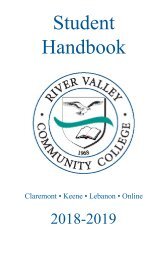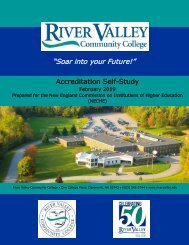Create successful ePaper yourself
Turn your PDF publications into a flip-book with our unique Google optimized e-Paper software.
shortened schedule (less than 15 weeks) must meet the semester equivalents for a credit<br />
load outlined in Table 4.2<br />
Additional courses described in this policy that are offered by River Valley include Clinicals,<br />
Fieldwork, Affiliations, Practicums, and Internships. Contact hours for these classifications<br />
are 60 minutes of direct instruction. All courses in these categories follow the policies<br />
outlined by the CCSNH BoT with regard to credit load (outlined in table 4.2) and level of<br />
oversight by <strong>RVCC</strong> faculty. Each of these courses has a course outline with measurable<br />
objectives and, depending on the classification, is overseen by <strong>RVCC</strong> faculty in different<br />
ways. Clinicals are taught in a patient/client care setting exclusively by <strong>RVCC</strong> faculty and<br />
are found in the Nursing, Massage Therapy, and Occupational Therapy Assistant programs.<br />
Fieldwork, Affiliations, and Practicums are found in the Occupational Therapy Assistant,<br />
Physical Therapist Assistant, Medical Laboratory Technician, Respiratory Therapy,<br />
Radiologic Technology, Medical Assistant and Early Childhood Education programs.<br />
Students in these courses are working in direct patient/client/child care facilities, and with<br />
approved preceptors while receiving regular oversight via electronic and in person visits by<br />
<strong>RVCC</strong> faculty. Internships are offered in the Phlebotomy program and have oversight<br />
similar to Fieldwork and Practicums. While many of <strong>RVCC</strong>’s programs have required<br />
competencies, we have no programs that are completely competency based.<br />
Guided Pathways & Program Mapping<br />
In Fall of 2016, <strong>RVCC</strong> began rigorously working on program mapping with a goal of<br />
introducing Guided Pathways and Academic Focus Areas. Many programs, particularly<br />
those related to the Allied Health and Health Science fields already had program maps that<br />
were provided to students during their first meeting with their academic advisors. Since<br />
Fall of 2016, every program has worked to streamline their program maps to ensure<br />
students are aware of which semester courses should be taken and the order which they<br />
should follow. All current program maps are housed in Canvas for access by any advisor<br />
to follow.<br />
Early College<br />
Our most prominent dual-enrollment program, Running Start, allows our courses to be<br />
taught at the high school facility by high school teachers who meet our credential<br />
requirements. Every high school instructor is overseen by a <strong>RVCC</strong> faculty member whose<br />
job it is to visit the classroom and assess that the content being taught meets the course<br />
competencies and is being delivered at the same rigor as it would be if offered directly at<br />
46 | P a g e





